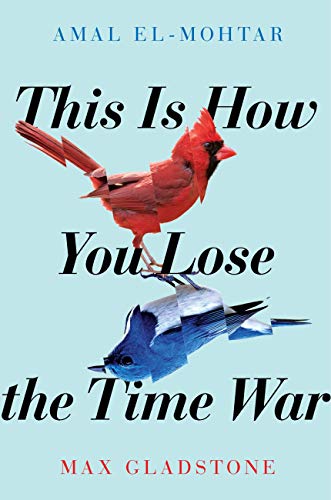Blue, as herself, cannot survive. Red, as herself, cannot reach her. But they have sprinkled bits of themselves through time. Ink and ingenuity, flakes of skin on paper, bits of pollen, blood, oil, down, a goose’s heart. [p. 179]
This is a difficult book to review: the prose is almost hallucinogenically vivid, the setting glittery with detail but hard to focus on, and the central love story -- of two soldiers on opposite sides of the eponymous Time War, each learning that they fit better with the other than with 'their' people -- as intricate and clever as a puzzle-box, and reliant on an innate understanding of chaotic cause-and-effect that may as well be magical.
Red represents the tech-flavoured Agency, Blue the organic growth of the Garden. They initially recognise one another as worthy opponents, and begin to correspond: but, for fear of discovery, by their own side or the other's, their letters must be encoded in the most baroque ways. Blue's first letter is marked 'burn before reading'; later communications are hidden in tree rings, in perforated bones, in a marine mammal's last, undigested meal. (If that last sentence sounds a little clunky it's because I was trying not to mention the puns: whacked seals, hoarse Trojans ...)
And someone or something is shadowing them, recovering the impenetrable remains of each letter.
Theirs is a beautiful love affair, replete with shared cultural references (Ozymandias, Chatterton, Naomi Mitchison's splendid novel Travel Light). I love the way the story flits from setting to setting, and the ways in which Red and Blue fit into each of those settings.
It's an accomplished collaboration: the two authors each wrote one character, and their styles are close and complementary enough that I didn't experience any disconnection between the two narratives. Also a very interesting read because while both protagonists -- and, I think, most of the other named characters? -- identify as female and use female pronouns, there are no particular gender markers. Indeed, both characters impersonate (?appear as, ?manifest as) males in one or more scenes. Writing Red and Blue as female is clearly a deliberate choice on the part of the authors, and I think it does change the ambience of the story: but it's hard for me to pinpoint how or why.
Luscious writing, mandatory suspension of disbelief, a reread required to reveal all the ways in which Red and Blue keep secrets from themselves and each other ... I'm glad I finally succumbed!

No comments:
Post a Comment